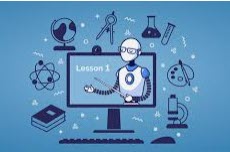
“You can’t teach people everything they need to know. The best you can do is position them where they can find what they need to know when they need to know it.“
— Seymour Papert, Professor Emeritus MIT
I have an increasing interest in AI chatbots and online learning since many institutions are integrating the applications to support students in teaching and learning. As learners, we need assistance in our educational journey, and chatbots can provide the information we need to know when we need to know it. Artificial intelligence is already part of our everyday lives from Siri, Alexa, and Google, so the advances in education are the logical next steps.
This link will explore the world of AI Chatbots and Online Learning and where you will meet ETEC BOT: https://etec523chatbot.weebly.com/

HI Anna. AI chatbots are truly emerging as a strong educational tool for learners as they are extremely convenient and informative. I appreciate your tackling of the data collection issue, for it is invaluablly helpful for the instructors to give practical feedback on what the learners are focusing/struggling with. I agree with Miguel that AI Chatbots are far from replacing the teacher’s essential roles, especially when it comes to giving feedback or providing innovative solutions to the learning obstacles. I understand your arguments on the design difficulties and costs, and I believe that chatbots can only provide support on static actions or FAQ in certain ways that might not suffice, at least in their current status. Therefore, we agree that the technical limitations exist and the coding issues are prevalent, so how do expect the teachers to trust AI chatbots on high-level educational support? Personally, I have a hard time dealing with bank chatbots or video communication robot assistants on the web as I find them repetitive and unable to effectively provide the solutions I need, even for the basic inquiries sometimes. Therefore, I believe that although this trend is enticing or promising, there is a long way ahead to make this technology efficient enough to satisfy the needs of the learners in educational settings, but who knows what the future holds?
Hello Feras,
I am also not fond of bank and video communication bots since they are designed to keep you away from humans. However, educational chatbots are emerging, and I won’t be surprised if they are more immersed, especially online learning. I regard educational chatbots as a TA for instructors depending on the learning environment. Can a chatbot replace a human no, but they can work alongside them. They can be an engaging tool for students, especially shy learners or those who may need additional assistance in class. There will be limitations like any other technology; however, they can play a role in higher education. Especially those chatbots that are designed for a specific course, such as Jill Watson. Educational chatbots have come a long way and still have many advances to make, but I believe they are here to stay.
Hi Anna,
I’m so impressed that you made an ETEC chatbot! I had no idea there were platforms available to do this without knowing how to code and will DEFINITELY be checking out Snatchbot and Juji. I’m curious, do you have access to analytics with your ETEC Snatchbot? I find chatbots surprisingly appealing, even when I know it’s being used to filter me through FAQ before providing contact information for an actual person. The process is usually quick and the illusion of chatting “with someone” is pleasant. I love the idea of a chatbot in a Learning Management System (LMS) that could help students navigate, find resources, jump to submission folders, locate due dates. etc. It can be a much more convenient (and pleasant) way to search for information. To respond to Miguel – Even as chatbots replace some tasks traditionally performed by tutors/teachers, I don’t expect them to completely replace tutors or teachers anytime soon because human relationships and connection is such an important element of learning. Of course, as AI advances, chatbots and other technology will increasingly simulate ‘human connection’ – and this will be a problem/opportunity reaching far beyond education and will have to be reconciled in many areas of society.
Hi Sally,
I have access to analytics with Snatchbot, but designers can integrate their own Google analytics with a subscription (pro plan). I particularly like Snatchbot because as a designer without a subscription; there is access to a lot of plugins and other options. I agree machines will not replace humans anytime soon, but I understand Miguel’s concern because technology has taken over human responsibilities over time. There is evidence of this in education, but as you referred to, human contact outweighs automated interaction. But, there is the factor of convenience (anytime, anywhere) that plays a significant role. Chatbots should be integrated into education, especially online learning. I would love to learn how to code, but fortunately, Bots can be designed without it.
Hi Miguel,
Interesting, you raise the point about machines vs. humans because ironically, I had the same discussion with a colleague before submitting my assignment. Discussing how helpful chatbots would be helpful in academic libraries and higher education overall. But, the argument was raised what would humans do? My view is that the role of AI machines is to fulfill roles that assist us in improving our performance in the workforce or in everyday life. I think it is up to us as humans to set the parameters as to the role of the machine. I do believe that too much of one thing brings consequences, but change is inevitable. We see this all our professions technology is creeping in and replacing humans because of efficiency, endless storage, and speed. From an educational perspective, there is a benefit for allowing AI to play a role and perhaps replace a human in some aspects. For example, MOOC courses were designed to make education accessible to everyone regardless of location or SES. However, one of the main problems is the globalization of the learners and access to support when needed. Some institutions have implemented TAs, but an AI chatbot can assist in supporting those students. And the more support, the better. Also, machines can only answer what we train them to answer. I believe a happy medium can be achieved between machines and humans. I also think that some industries do not consider human value but rather their bottom line (profit). Therefore, implementing any form of technology is a slippery slope; however, this is particularly evident with AI machines because of their capabilities. The more AI becomes immersed in education. Standard policies will be developed to meet human expectations but not replace humans.
Thank you for posting this interesting topic of chat bots! I have mixed feelings about AI and their ability to take the role of a human. I love technology and appreciate how convenient it is for facilitating day to day activities; however, my concerns always lie on where we draw the line. I think Siri and other assistive voice devices (and chat bots) are useful and should stay where they are… They already facilitate too much in our daily lives and personally don’t believe bots should be taking over the role of a tutor or teacher. This will cause the creation of a huge gap between technology and humans. I don’t like when technology takes away from jobs others can have, like the ongoing industrial revolution. I’m am very aware of all the pros in the information you gathered, but don’t you believe that TOO much of everything always brings consequences? So, allowing technology to advance too far or allowing it to evolve too “smartly”, will cause issues in the long run? I am not trying to bring up speculation or controversy, simply wondering how we can balance the way we seek to advance in AI programming and are true intentions for doing so? Besides monetization, are there any real reasons to advance to a level where machines can basically so everything we do but better? Looking forward to your thoughts on this!